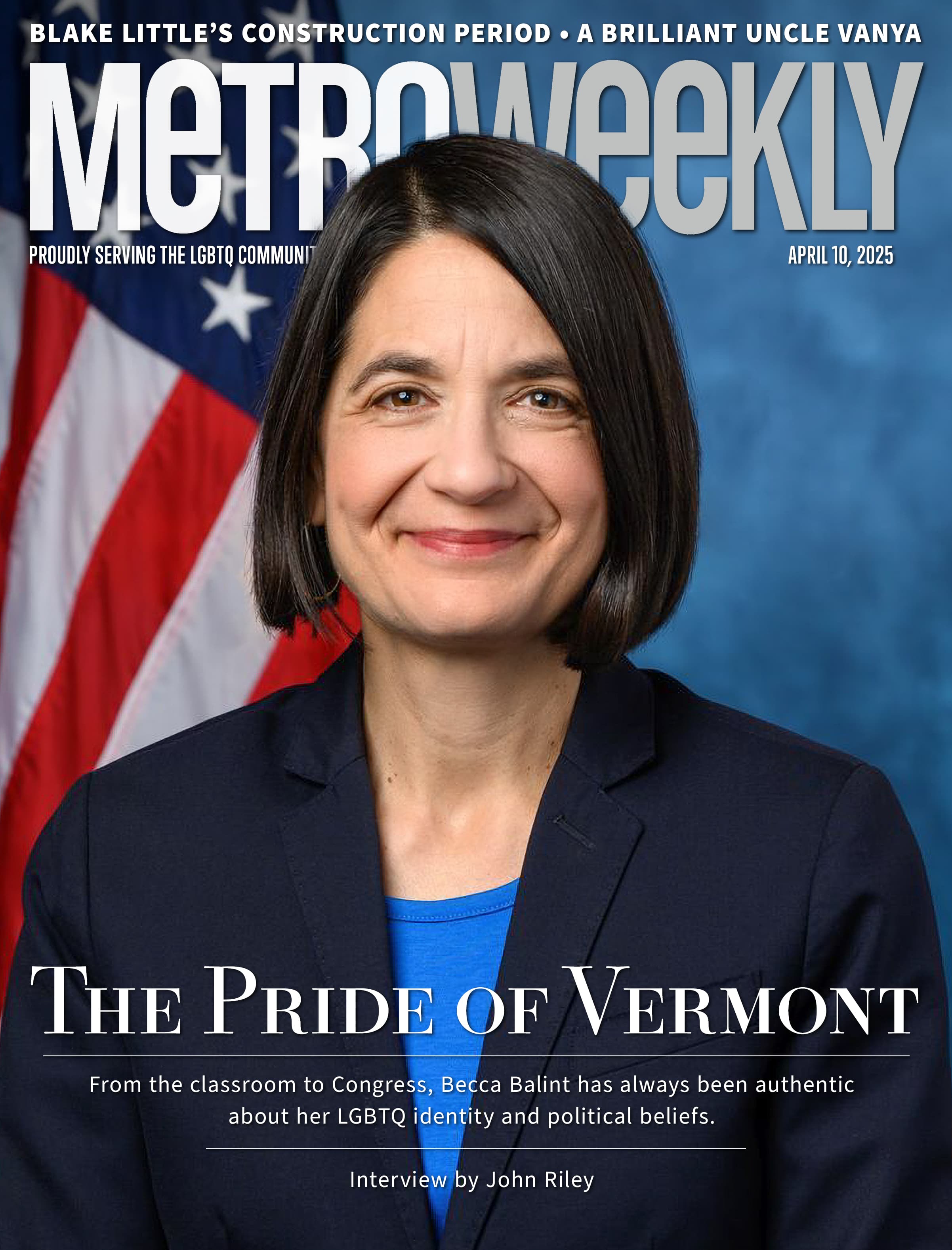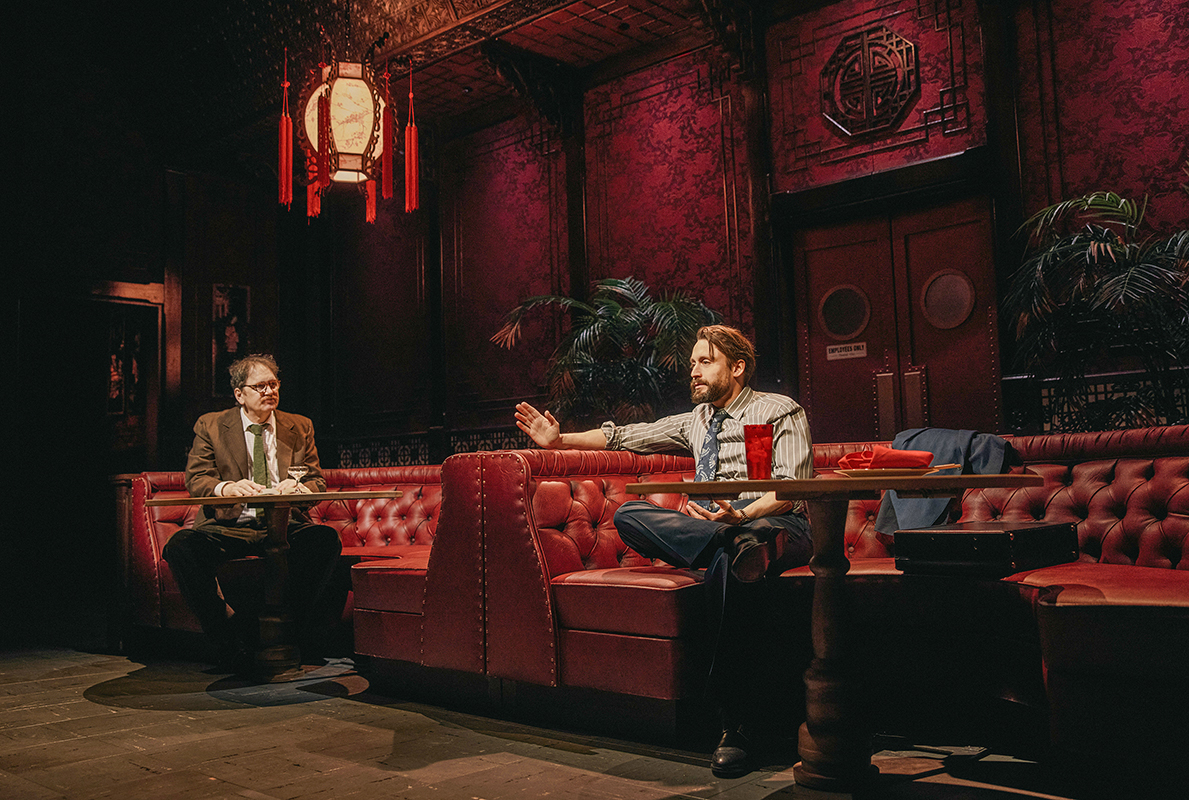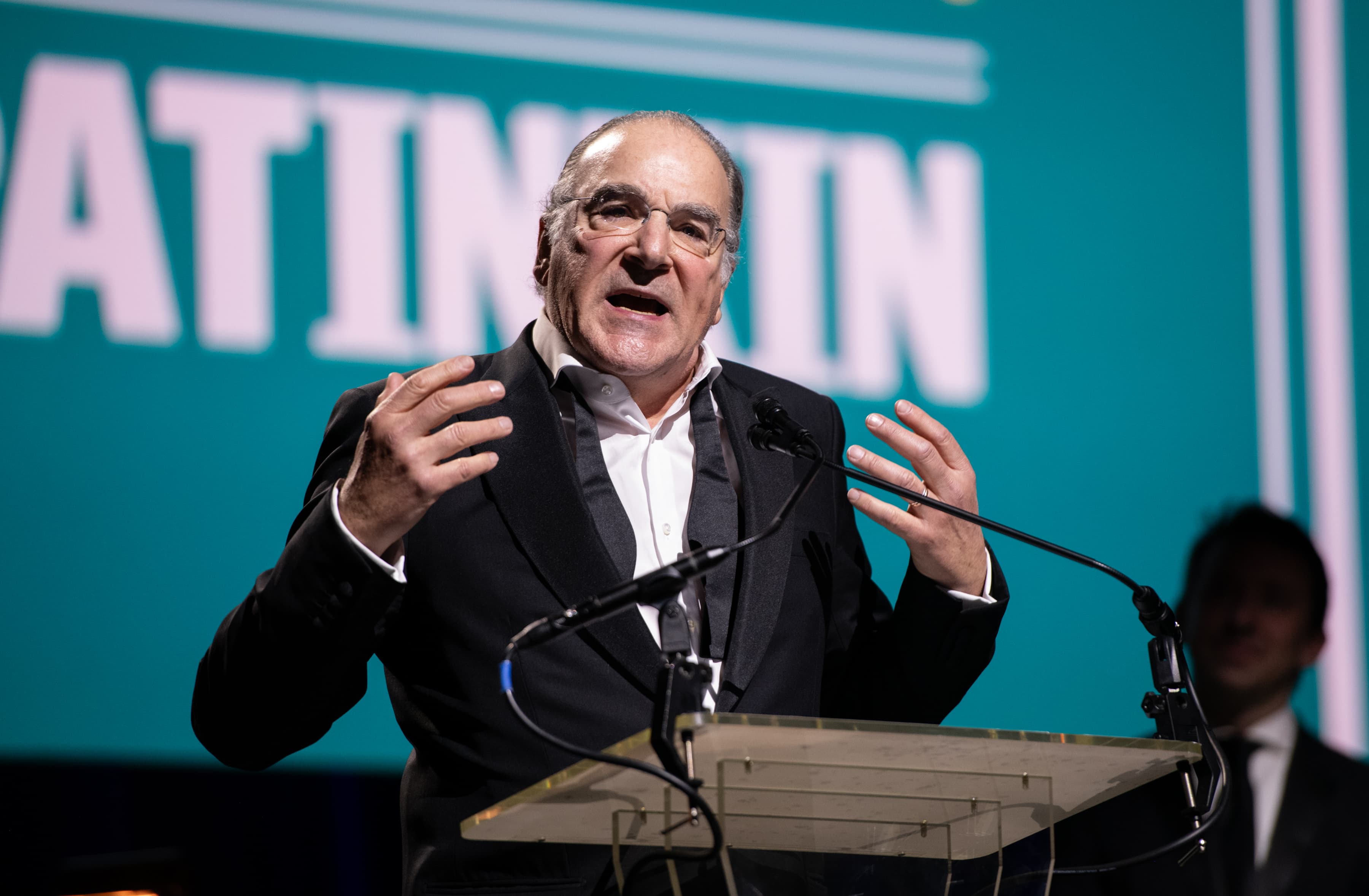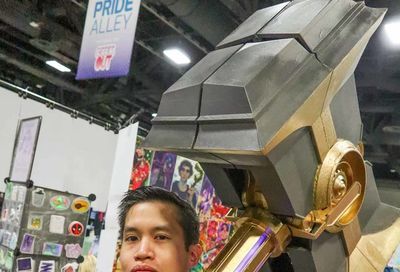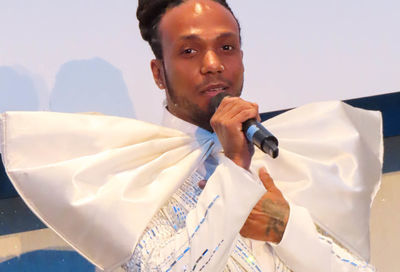Rocket Man
Eric Schaeffer's meteoric rise to the heights of theatrical success
Of all the places you’d expect to find one of theatre’s brightest young luminaries, Shirlington isn’t one of them.
We’re not even talking about “fancy” Shirlington, the village-style development in Arlington County, Va., where yuppies clamor for trendy meals and art films, and around which shining new office towers and apartment buildings spring up at a startling rate. No, if you’re looking for Eric Schaeffer — acclaimed regional theatre leader, Broadway and West End director, Sondheim Celebration artistic head, corporate entertainment power broker — you have to go several blocks off the beaten path to old Shirlington.
There, at the Schaeffer-co-founded Signature Theatre, patrons squeeze their cars in between the cabs of eighteen-wheelers parallel parked along South Four Mile Run Drive. The “amenities” that surround Signature are car repair shops and salvage yards, not CVS or Starbucks. Hedwig and the Angry Inch, the groundbreaking musical directed by Schaeffer for its D.C. area premiere, like all of the successful company’s generally-in-high-demand shows, can’t have Saturday matinees. Why? The small garages tucked behind the less-than-soundproof building are still open for business then, complete with the ear-splitting sounds of pneumatic tools.
But to hear Schaeffer tell it, this grimy strip of urban Americana just across the Potomac is his nirvana — his stomping ground where an intense love for the stage led him, with no formal training, to give up a flourishing art direction career and launch a professional theatre from scratch. In little more than a decade, Signature has grown into a company bursting at the seams, overflowing with awards, and awash in a national reputation for being fertile creative ground where plays and musicals — from problematic oldies to edgy works hot off the press — receive top-notch treatment.
Schaeffer’s natural charm and talent, not to mention local success, have also put him on a first-name, phone-call-away basis with such high-rollers as composer Stephen Sondheim and British producer Cameron Mackintosh. These are the kind of relationships that have landed Schaeffer directing gigs in musicals others only dream of: Putting It Together with Carol Burnett on Broadway, The Witches of Eastwick in London’s West End, and two of the six new productions slated for this summer’s Kennedy Center theatre world-rocking Sondheim Celebration, for which he was also named artistic director.
He even holds yet another position — one that pulls him away to New York on occasion — with media and entertainment giant Clear Channel Communications, where he leads development efforts for new theatrical properties. It’s been a fast track, indeed, to success. And there is quite simply no end in sight.
MW: Did you imagine when you started Signature that it would be as successful as it is now, in such a relatively short period of time?
ERIC SCHAEFFER: I really didn’t. I always tell people it’s like a snowball I pushed down the hill, and we’re still running to catch up to it. When I started the theatre, I said, “Oh, I’m only going to be here ten years, then I won’t know what to do anymore, and someone else can take it over.” But I’m still contributing and making us do things we didn’t do before. And I have this long list of stuff I still want to do here. It’s exciting where the theatre is going to go in the next couple of years. It involves new space, expanding the programs we have, getting a second, smaller space to do more experimental work, and also doing much more in education. I’m really psyched about the opportunities.
MW: Even by Signature standards, your current production Hedwig and the Angry Inch is kind of “out there.” Did you feel any hesitation about doing it?
SCHAEFFER: None at all. The thing is, it’s not a show about transvestites. It’s not about a drag queen. It’s not a show about a man whose penis got cut off from six inches to one inch. There’s a really wonderful story there. You think it’s going to be one thing, and you sit there, and all of a sudden you go, “I never expected it to take me there and to do that.” Just the subject matter, and the songs they’ve written to support it to help tell the story — it’s just fresh and exciting. It really is a brand new, different way of looking at a musical.
MW: It’s no small feat for a musical to earn a reputation, as Hedwig has, for being genre-revolutionizing. What makes it so special?
SCHAEFFER: The story. You see someone who’s gone through all of these things — this botched sex change, being divorced and left in a trailer park — but still says, “You know what? Life’s okay. Life’s great. It’s okay to be who you are and live your life.” We can hear that, but when you actually go on the journey with someone who’s gone through all these huge decisions and all these unfortunate things, it’s a whole different emotion, a whole different sense of going, “Yes, if she can do it, I can do it.” That’s what’s really exciting about it. The Hedwig character supports that, and the music supports that. It’s that one idea — a big idea — that can change the world.
MW: Among professional theatre leadership in this area, you really have something of an unprecedented level of openness in terms of the kind of material you take on — alternative, gay-oriented themes — as well as your sexual orientation. Did that just come naturally, or have you held anything back for fear of not succeeding?
SCHAEFFER: No, it’s gotten me in trouble the other way around, because I say, “Oh, we should just do this, it’s really important.” There are some shows where I’ve gotten a lot of letters from people either offended or appalled. I write back to every single person, and I’ve said, “Look, it’s not my job to censor people. You may not agree with it, I may not agree with it. It’s another voice we need to hear. We’re all in this melting pot together.”
MW: As an arts community leader, and as a gay person, do you feel any particular sense of obligation to the gay community?
SCHAEFFER: When I pick plays, I just feel like it’s my job to tell everyone’s story, whether that’s gay, straight, African-American, whatever. If it just happens that it’s gay, that’s great. There are some times when I’ve said, “You know, we need to find an edgy play. We need something to stir it up a little bit here.” I never shy away from the gay audience at all, which is a good thing, because there are other folks who have to because of what their theatres are and what they produce.
MW: Has your gay audience response been generally supportive, or do you run into criticism from them too?
SCHAEFFER: They’ve been really great. They sense there’s a good balance.
MW: And gays love musicals.
SCHAEFFER: [Laughs.] Right, we all love musicals, so what could be better? Let’s put on our tap shoes and dance!
MW: Because we’re also focusing on Michael Kahn in this issue, tell me about your personal experience with him in the theatre community.
SCHAEFFER: He’s been amazing. He directed here, and he’s been fantastic. He’s a great collaborator. When I’ve had problems, I’ll say, “Can I go to lunch with you? I want to talk with you about something.” He’s like, “Absolutely.” He’s been a mentor, and it’s great to have him in the city. We’re so lucky to have him here.
MW: How did you forge a relationship with him?
SCHAEFFER: I eventually just called him up and said, “I’m this kid who runs Signature. We should meet!” You’re just young and naïve, and then you realize, “Oh, he runs Juilliard. Duh!” I’ve always admired his work. When I see Michael’s shows, I can really appreciate his direction, and I can appreciate how he tells a story. When you go and see any good production, or any good director’s work, you learn from that, whether it be a play, musical or Shakespeare. I always know when I see one of his shows, I’m going to take something away from that, going, “Oh, that was really smart, and that was really great the way he told us this.”
MW: Let’s talk about Sondheim. How have you made such a strong creative connection to his work?
SCHAEFFER: As an artist, he’s great at telling stories in a way many people can’t. What’s really fascinating about him is that every show he does, he really reinvents himself in a way, and he explores subjects that people are afraid to explore, really. It’s challenging from the artistic point of view — designer, director — but it’s also challenging for the performers and the audiences.
MW: How have you developed a widely regarded knack for doing Sondheim well at Signature, when so many theatres can’t, or don’t even try?
SCHAEFFER: Anytime we do a Sondheim show at Signature, everyone gets really passionate about it. It’s like one of things where the stars are always aligned. As with any show, we set out to the best possible show. But with Sondheim, we all just get a connection to it. I don’t know that there’s any special formula.
MW: How did you get to know Sondheim personally?
SCHAEFFER: I was doing Sunday in the Park with George with The Arlington Players in the ’80s, and I wrote Sondheim a letter. We struck up conversations writing back and forth. Then I met him, and one thing kind of led to the next.
MW: Kennedy Center president Michael Kaiser is credited with the Sondheim Celebration idea. Were you his first choice to lead the festival artistically?
SCHAEFFER: Yes, he’d heard about me, and he knew about my relationship with Steve, and the Sondheim work we’d done at Signature. He just thought it would be a perfect fit.
MW: Is the festival a one-of-a-kind undertaking?
SCHAEFFER: Yes, it’s a never-before-attempted-anywhere-in-the-world thing. Not just a Sondheim repertory, but any composer done in rep like this. It would be one thing if you were doing concert versions of these shows, where you had a week of rehearsals and threw it up there. But each production is brand new. They all have different sets, and casts, and everything. It’s pretty amazing. And for the Kennedy Center, it’s great. It shows them as a producing entity again, which they haven’t been for ten years. They’ve gotten a lot of flak about just being a booking house. With the festival, that perception changes. Plus, we’ve hired a lot of Washington actors to give them work all summer long. It’s providing opportunities that were never there before for directors, actors, choreographers, musicians.
MW: We’ve been discussing in the MW office the topic of who “gets” Sondheim, and who doesn’t. There’s not really a middle ground, and some people perceive fan devotion to — and often obsession with — his work as a bit ridiculous and off-putting.
SCHAEFFER: Right, and I think they’ll see here that it’s very accessible. I want people to know there’s a very human core to his work. People will see his body of work and all of a sudden go, “I couldn’t understand him before. Look what I’ve been missing.”
MW: How do you feel about Sondheim’s adoption by the gay community as something of an icon — or at least a source of pride — in the sense that we can point to perhaps the greatest living musical theatre composer and say, “He’s one of us.”
SCHAEFFER: It’s good.
MW: Yet the Sondheim audience has never really seen overtly gay content in his work.
SCHAEFFER: Right.
MW: So take a gay person like me. I love musicals. I love Sondheim. And I also love to see gay stories told. Of course, I appreciate universal themes in theatre that make straight stories relevant to gay people, and vice versa. But part of me hungers for more specifically gay works from prominent gay artists. Do you ever see that happening with Sondheim?
SCHAEFFER: No, and I don’t want that. I want artists to write something they feel passionate about, that there’s a story they feel they need to write. If that means a gay story, straight, whatever — that’s the story they tell. Any artist will tell you if you’re not passionate about something, it’s very hard to create it. It’s hard to put conditions on someone’s writing.
MW: What drives an artist’s passion, though? It would seem logical that someone would be more passionate about things they’re more familiar with, and a gay person would have more insight into same-sex relationships.
SCHAEFFER: That’s true, or it could be the other way around. They could say, “I know about that, I’d rather write something about this that I know absolutely nothing about, that I can research and approach from a whole different, fresh point of view. It’s not going to be clichéd, and people won’t come in with all these preconceived notions.”
MW: You have so many professional demands right now. How do you maintain your personal life balance in the midst of it all?
SCHAEFFER: You just have to carve away time for yourself. It’s really important to do, and not get swallowed up in everything else. You say, “You know what? This is my day, or these are my four hours, and that’s the way it is.” It’s hard, but it’s really important. It helps you keep your sanity. There are times when it’s absolutely crazy, but that’s maybe a day or two, and you just know that, and you get through it. Then you’re back to the normal grind.
MW: Are you at your maximum capacity right now of what you can take on?
SCHAEFFER: No, but the festival is very intensive. Once I get through the summer, I have a vacation planned, which is very good, so I see the light at the end of the tunnel. I know what it’s going to take to do the festival. I know how big it is, and I know the energy it’s going to take. I’m totally geared up and ready for that, but I also know at the end, it’s going to be time to say, “Whoa, I need to chill out a little bit and regroup.” I’ve had offers to work on other shows, and I’m like, “I can’t do anything until the end of August. We can keep talking, but I won’t even pick up a pen or read a script before then.” Some people can’t wait, others can.
MW: Are you ever surprised or overwhelmed by your success, not to mention the sheer volume of your workload?
SCHAEFFER: A lot of times I feel really fortunate that I’ve been able to do the stuff I wanted to do, and also be able to say, “You know what, I’m not going to do that. I’m going to take a break.” I’m really lucky.
MW: It sounds like you’ve achieved your success by being very nice and genuine. You haven’t been a big screaming, backstabbing diva in order to climb the ladder.
SCHAEFFER: [Laughs.] I hope not! Life is too short. Even though we do this as a job, I want to enjoy what I do. You don’t get anywhere by screaming at anyone. All it does is alienate people. Theatre is a collaboration, and it’s so important that everyone is working on the same team. Yeah, you need a captain of that team. But we all have to be working toward the same goal. You’re not going to get there by alienating anyone. When you work with actors, it’s so important that rather than dictate everything they do, I learn from them and they learn from me. So many people who feel like they have to scream and yell are maybe just insecure, or maybe doing it for the wrong reasons. I know I approach it differently than a lot of people do. That’s also a good thing. It’s refreshing to people.
MW: If your professional peers with similar goals had achieved the career plateaus you have by this point, they probably wouldn’t stay connected to a theatre like Signature — not because it isn’t a fine company, but simply because it’s at a different level in the industry. Yet you’re able to function, and flourish, at several levels simultaneously.
SCHAEFFER: I’ll tell you, there’s nothing more exciting than doing a huge, huge show where you have all these millions of dollars, and then saying, “I’m going to go work in a garage now — a one-hundred-fifty-seat theatre where the budget is nothing — and make art.” That’s the most refreshing thing.
Support Metro Weekly’s Journalism
These are challenging times for news organizations. And yet it’s crucial we stay active and provide vital resources and information to both our local readers and the world. So won’t you please take a moment and consider supporting Metro Weekly with a membership? For as little as $5 a month, you can help ensure Metro Weekly magazine and MetroWeekly.com remain free, viable resources as we provide the best, most diverse, culturally-resonant LGBTQ coverage in both the D.C. region and around the world. Memberships come with exclusive perks and discounts, your own personal digital delivery of each week’s magazine (and an archive), access to our Member's Lounge when it launches this fall, and exclusive members-only items like Metro Weekly Membership Mugs and Tote Bags! Check out all our membership levels here and please join us today!




